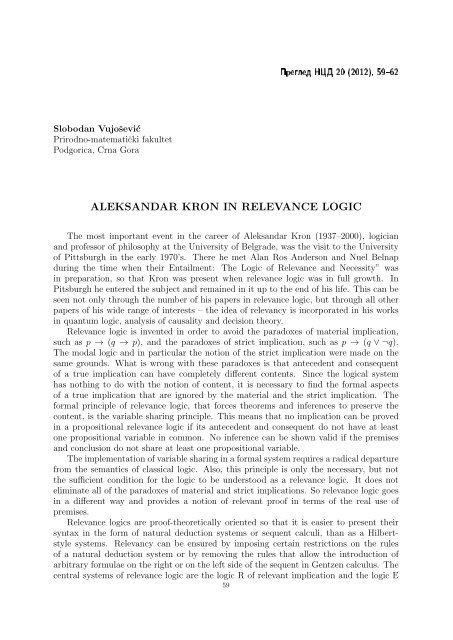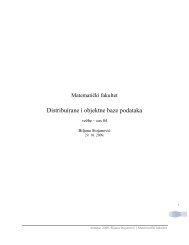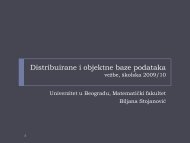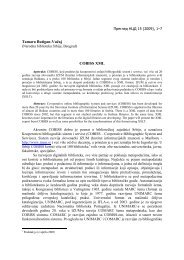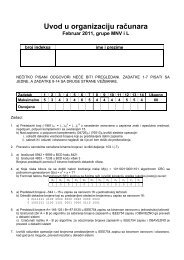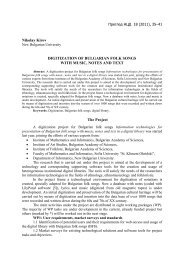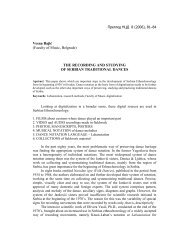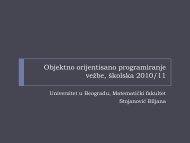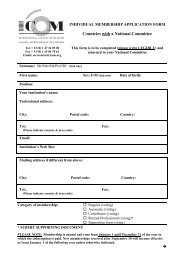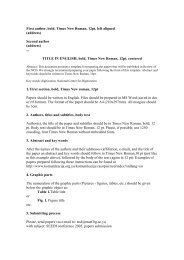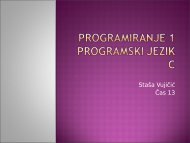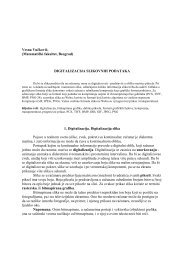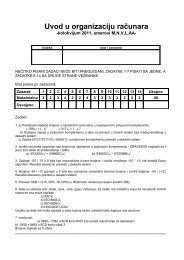ALEKSANDAR KRON IN RELEVANCE LOGIC
ALEKSANDAR KRON IN RELEVANCE LOGIC
ALEKSANDAR KRON IN RELEVANCE LOGIC
- No tags were found...
Create successful ePaper yourself
Turn your PDF publications into a flip-book with our unique Google optimized e-Paper software.
Pregled NCD 20 (2012), 59{62Slobodan VujoševićPrirodno-matematički fakultetPodgorica, Crna Gora<strong>ALEKSANDAR</strong> <strong>KRON</strong> <strong>IN</strong> <strong>RELEVANCE</strong> <strong>LOGIC</strong>The most important event in the career of Aleksandar Kron (1937–2000), logicianand professor of philosophy at the University of Belgrade, was the visit to the Universityof Pittsburgh in the early 1970’s. There he met Alan Ros Anderson and Nuel Belnapduring the time when their Entailment: The Logic of Relevance and Necessity” wasin preparation, so that Kron was present when relevance logic was in full growth. InPitsburgh he entered the subject and remained in it up to the end of his life. This can beseen not only through the number of his papers in relevance logic, but through all otherpapers of his wide range of interests – the idea of relevancy is incorporated in his worksin quantum logic, analysis of causality and decision theory.Relevance logic is invented in order to avoid the paradoxes of material implication,such as p → (q → p), and the paradoxes of strict implication, such as p → (q ∨ ¬q).The modal logic and in particular the notion of the strict implication were made on thesame grounds. What is wrong with these paradoxes is that antecedent and consequentof a true implication can have completely different contents. Since the logical systemhas nothing to do with the notion of content, it is necessary to find the formal aspectsof a true implication that are ignored by the material and the strict implication. Theformal principle of relevance logic, that forces theorems and inferences to preserve thecontent, is the variable sharing principle. This means that no implication can be provedin a propositional relevance logic if its antecedent and consequent do not have at leastone propositional variable in common. No inference can be shown valid if the premisesand conclusion do not share at least one propositional variable.The implementation of variable sharing in a formal system requires a radical departurefrom the semantics of classical logic. Also, this principle is only the necessary, but notthe sufficient condition for the logic to be understood as a relevance logic. It does noteliminate all of the paradoxes of material and strict implications. So relevance logic goesin a different way and provides a notion of relevant proof in terms of the real use ofpremises.Relevance logics are proof-theoretically oriented so that it is easier to present theirsyntax in the form of natural deduction systems or sequent calculi, than as a Hilbertstylesystems. Relevancy can be ensured by imposing certain restrictions on the rulesof a natural deduction system or by removing the rules that allow the introduction ofarbitrary formulae on the right or on the left side of the sequent in Gentzen calculus. Thecentral systems of relevance logic are the logic R of relevant implication and the logic E59
60 S. VUJOŠEVIĆof relevant entailment [Anderson, Belnap, 1975]. The logic R had been known long beforethe work of Anderson and Belnap, but they gave it the definite form and invented thelogic E, and a bulk of other relevance logics close to both R and E. Among the theoremsthat are provable in the logic R there are, for example:Identity: A → A,Suffixing: (A → B) → ((B → C) → (A → C)),Assertion: A → ((A → B) → B),Contraction: (A → (A → B)) → (A → B)Distribution: (A ∧ (B ∨ C)) → ((A ∧ B) ∨ (A ∧ C)),Contraposition: (A → ¬B) → (B → ¬A),Double negation: ¬¬A → A.In the logic E of relevant entailment the implication was supposed to be a strict relevantimplication. To achieve that, Anderson and Belnap defined the logic E such that in thislogic one can prove the theorem ofEntailment: ((A → A) → B) → B.Entailment is not provable in R so that R and E are different logics. If we present themas Hilbert-style systems, with modus ponens A → B, A ⊢ B and adjunction A, B ⊢ A ∧ Bas rules, then the logic E is the logic R minus assertion plus entailment. The logics Rand E are variable sharing and do satisfy conditions of the real use of premises so thattheir implications are relevant. If we add the necessity operator □ to R, together withthe axioms □(A → B) → (□A → □B) and (□A ∧ □B) → □(A ∧ B), and necessitationrule A ⊢ □A, we obtain the modal logic of strict relevant implication NR. But the logicNR is different from E since, in some natural translation, there are theorems of NR thatare not theorems of E, so that there are at least two logics that are candidates for theproper logic of strict relevant implication.Among the problems with the logics R and E, we shall first mention the problem ofthe deduction theorem. After a long discussion in their Entailment, Anderson and Belnapconcluded that, for the logics E and T (the relevance logic different from R and E), thereis no deduction theorem in standard form. Kron [1973, 1976], found what is known asthe best form of deduction theorem for the relevance logics T, E and R. The deductiontheorem is crucial for the implication in every logical system so that this is one of Kron’smost notable achievements in relevance logic. Charles Kielkopf in [1977] named certainderivations Kron derivations and deduction theorems, for relevance logics Kron Deductiontheorems.Another unusual property of the propositional logics R and E is that they are undecidable[Urquhart 1984]. These facts motivated Krons investigation of the subsystemsof R and E as systems without distribution, without contraction or without involutivenegation. Since the axiom of distribution is behind the failure of decidability of R andE, and because of the natural proof-theoretical way in which relevant distributionlesslogics arise, Došen [1993] believes that the central relevant logic should be R minus distributionand that its modal extension NR minus distribution, and without the axiom(□A ∧ □B) → □(A ∧ B), is a better candidate for the logic of strict relevance implicationthan the logic E. But there are semantical arguments in favor of distributivity -the semantics evaluates sentences as true or false in each world and treats conjunctionand disjunction extensionally [Belnap 1993]. Kron believed in distributivity and tried toovercome undecidability of relevance logic by the removal of the contraction axiom. Thepresence of contraction corresponds to allowing premises to be used more than once. In
S. VUJOŠEVIĆ 61the system of natural deduction with subscripts for relevance logic, subscripts serve tocontrol the relevant use of premises and are finite sets. In the absence of contractionsubscripts also serve to count the number of occurrences of premises, so that suscripts arenow becoming finite multisets. These systems are not at all easy and Kron was carefuland patient enough to develop and improve the specific subscript techniques for Getzenformulations of several relevant logics in the neighborhood of positive fragments of thelogics R and T without contraction [Kron 1978, 1980; Giambrone and Kron 1987]. Forthese systems Kron proved the cut elimination theorems and obtained the decidabilityprocedures.Similar subscript techniques Kron used to solve the identity problem for the ”mostweak relevance logic” posed by Belnap in early 1960’s [Kron 1985]. The logic was formulatedin the language that contains propositional variables, parentheses and implication,has modus ponens as a rule, and has the following axiomsPrefixing: (B → C) → ((A → B) → (A → C)),Suffixing: (A → B) → ((B → C) → (A → C)).Belnap asked for the proof that no instance of the identity axiom A → A is a theoremin this logic or to say in different way, if A → B and B → A are provable in thelogic with identity, prefixing and sufixing, then A and B are the same formula. Theproblem remained open for about twenty years, and was solved in 1983 by R. K. Meyerand E. Martin, using the algebraic and semantical methods. Kron solved the problemconstructively in the sequent system, that contains the most weak relevance logic.Among the arguments in favor of weaker relevance logics is not only the decidability.There is another feature that makes the relevance logic without contraction attractive -in the first-order predicate version of this logic, one can formulate a consistent naive settheory (with unrestricted comprehension axiom). The motivation for this logic came fromthe logic known as Grishins logic - the first-order predicate calculus without contractionaxiom [Grishin, 1974]. Grishins logic is decidable and the distributivity is not provablein it. Kron defined a relevance variant of Grishins logic. This variant is close to quantificationalR without contraction and, in contrast to Grishins logic, it is distributive. Kronwas not willing to leave the distributivity. The logic has a Gentzen-style formulationand it is a decidable first-order logic with the Craig-Lindon interpolation property [Kron1993].The semantics of relevance logic is a Kripke-style semantics, but with the ternaryaccessibility relation R between worlds, and with the semantic clause for implication:A → B holds in the world a if and only if, for all the worlds b and c,if R(a, b, c) and A holds at b, then B holds in the world c.But the use of the ternary relation is not sufficient to avoid all the paradoxes of strictimplication. This brings us to the non-classical clause for negation. It requires an operator∗ on the worlds such that¬A is true in a if and only if A is false in the world a ∗ .Once again, it is difficult to interpret this quite formal clause.Kron did not study semantics, but he stimulated the investigation in this direction.Kosta Došen and Milan Božić worked with a ternary relation R such that R(a, b, c) meansa·b ≤ c, where · is a binary operation on worlds that corresponds to intensional conjunctionand where ≤ is a partial ordering on worlds, so that the semantic clause for implicationwas:


